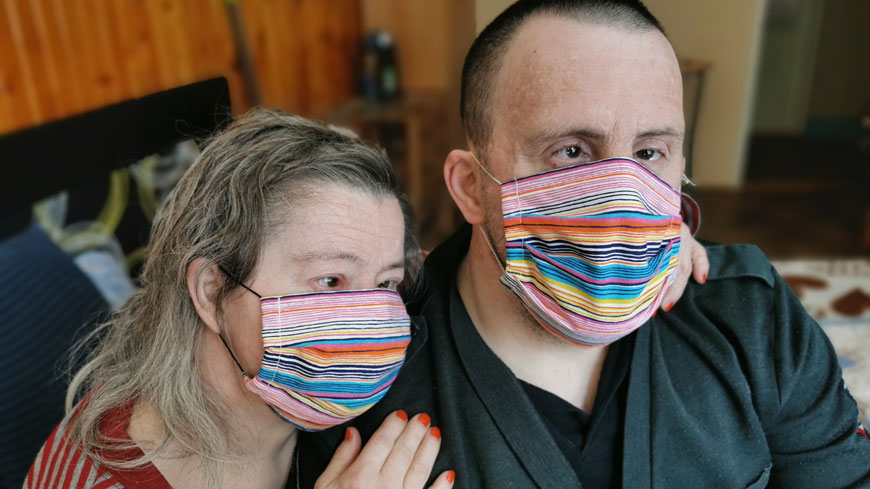As governments in Europe react to the rapid spread of the coronavirus through wide-reaching measures, they must not forget that a large proportion of their population is living with disabilities. Persons with disabilities are not only often at increased risk of serious health complications, but they also have particular support needs in this challenging period. These needs must be factored in from the very outset when responding to the pandemic.
Although the ongoing crisis is unprecedented, respect for international human rights standards must be at the heart of state responses to it. In this connection, it is important to remember that Article 11 of the UN Convention on the Rights of Persons with Disabilities (CRPD), ratified by 46 of the 47 member states of the Council of Europe, provides that states shall take “all necessary measures to ensure the protection and safety of persons with disabilities in situations of risk, including situations of armed conflict, humanitarian emergencies and the occurrence of natural disasters”.
Most member states rightly imposed social distancing measures to reduce the spread of the virus, but they have not been systematically attentive to the specific circumstances and needs of persons with disabilities. As the UN Special Rapporteur on the rights of persons with disabilities pointed out, "containment measures, such as social distancing and self-isolation, may be impossible for those who rely on the support of others to eat, dress and bathe".
In this connection, I am deeply concerned by the growing risk of disruption to essential support services for persons with disabilities. Everywhere in Europe, providers of such support services and social workers are reporting serious problems jeopardising the continuity of these services, including staff shortages due to illness or confinement measures and a general lack of personal protective equipment, which puts them and service users at risk. States must take all necessary actions to address these problems, including if necessary by taking extraordinary measures such as relaxing recruitment procedures; prioritising core services; providing financial aid to persons with disabilities to make up for additional expenses caused by the situation; and integrating providers of support, including informal support, to persons with disabilities in public emergency planning concerning the provision of personal protective equipment and training.
When relevant measures are being designed, evaluated or refined, it is essential that states ensure that persons with disabilities, through their representative organisations, are also at the table, along with representatives of support providers.
Many persons with disabilities in Europe are also still deprived of their liberty in large residential settings, including institutions and psychiatric hospitals, in spite of states’ international obligations under the CRPD and long-standing calls from international human rights bodies, including my Office (most recently with regard to Bosnia and Herzegovina, Romania and Armenia). While residents in such institutions often face neglect and inadequate health care at the best of times, this pandemic has unfortunately brought to the forefront the additional serious health risks persons with disabilities are exposed to in such settings, with the UN High Commissioner for Human Rights pointing to the risk of COVID-19 “rampaging through such institutions’ extremely vulnerable populations”.
In the short term, it must be the utmost priority for states to reduce these risks, including by stopping new admissions, by moving people with disabilities out of these institutions as much as possible, and by taking all necessary precautions to protect their residents. When it comes to stopping new admissions, I have concerns regarding emergency measures which on the contrary relax rules for placements in closed settings, such as the ones enacted in the UK. As regards the general measures that states must take to protect the residents of such institutions from infection, these will inevitably come at the price of increased isolation of persons with disabilities and great sacrifice from staff members, who in many countries are already confining themselves together with residents. This isolation must be mitigated as much as possible, for example by increasing the use of accessible forms of electronic communication.
There is also a growing concern among persons with disabilities that, as the available life-saving health care resources are put under increasing strain due to the pandemic, they will be left behind in accessing life-saving interventions. It is the foremost duty of all member states to ensure that this does not occur and to reassure people with disabilities that they will not risk discrimination on the basis of disability in accessing health care and that their needs will still be addressed adequately.
From the outset, I underlined the need for transparent and accessible information regarding the pandemic and measures taken to counter it, in a situation where potentially life-saving information is evolving at breakneck speed, while false and misleading information is also thriving. In this respect, persons with disabilities have a variety of very particular needs, which have not been met on many occasions. I welcome the fact that some, such as the French government, took steps to create dedicated information for persons with disabilities on their main webpage on the coronavirus, and many governments made efforts to provide information in easy-to-read or sign-language versions, for example in Germany, Italy, Romania and France, where an easy-to-read version of the form necessary to leave one’s house is also available. The outstanding work done by national NGOs in this domain must be supported and amplified through all available communication channels.



